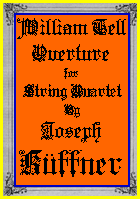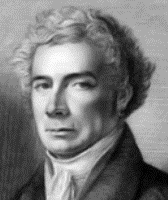Presents
Joseph Küffner
 |
 |
Please note, there has not been any full recording of Küffner's arrangement that we could find. Our soundbite is of two partial performances by two different ensembles each playing a section. Still these clearly demonstrate the excellence of his arrangement. |
Rossini's William Tell Overture arranged for String Quartet
The tradition of transcribing and arranging famous works has enjoyed a long and honored history. By the beginning of the 19th century, arrangements of famous opera overtures were common place. The William Tell Overture is one of the best known pieces Rossini ever composed. It is far more famous than the rest of the opera. Since its composition in 1829, there have been literally dozens of arrangements of the Overture from William Tell for various ensembles, including the string quartet. Unfortunately, virtually all of those for string quartet but one have appeared in emasculated or bastardized versions, many designed for beginners and virtually none by an accomplished composer with the exception of that by Joseph Küffner. His many arrangements of popular operas were admired for their excellence, were tremendously popular, were widely circulated and gave much pleasure. Those who have had the chance to either play or hear Küffner's superb arrangement invariably agree that it is highly effective and as true to the original as one could hope for in a version for string quartet.
Joseph Küffner (1776-1856) was born in the Bavarian city of Wurzburg where his father was the court music director. Küffner studied violin and served as a member of the Ducal Orchestra as well as a soloist. Besides the violin, he was proficient on the harpsichord, piano, organ, clarinet, basset horn and guitar. He later was appointed Military Music Director of Bavaria. His works for military band were so well thought of that for several decades the Armies of the Bavaria marched to his music. He wrote over 300 works in all genres, of which the bulk were for chamber ensembles and which were extraordinarily popular during his lifetime. Today, he is exclusively remembered for his compositions for the guitar and for wind instruments. Although primarily a violinist, like Paganini, Küffner's reached a very high level of proficiency on the guitar because he not only included it in his chamber music compositions, but also wrote etudes for it.
The original edition of Küffner's arrangement was published by the famous firm of Schott in Mainz and dates from 1840. We were fortunate to have a pristine copy of the original in our possession.
Parts: $19.95